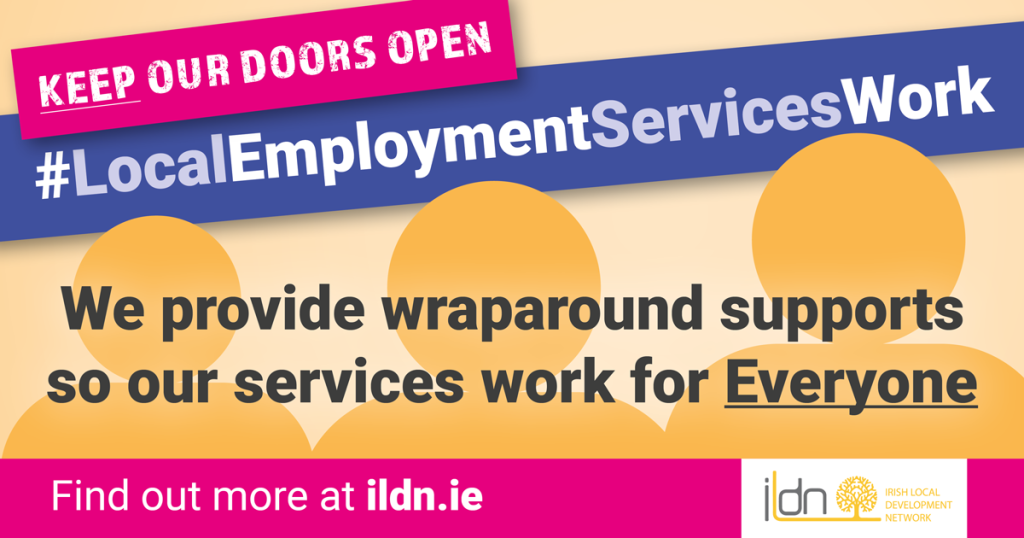
PATHWAYS TO WORK STRATEGY THREATENS THE FUTURE OF NORTH DUBLIN LOCAL EMPLOYMENT CENTRE
- Oct, 2021
- |
- Employment
- |
Northside Partnership Local Development Company has warned that their Local Employment Services and Job Clubs which have served the community for over 25 years are fighting for survival due to new proposals in the Pathways to Work Strategy to require all Local Employment Services compete in an open tenders with private providers.
Paul Rogers of Northside Partnership questioned the Government’s proposal to replace the comprehensive and integrated services for jobseekers currently delivered by the LES and Job Clubs with a new Regional Service.
 Mr. Rogers said “The Government proposals will inevitably lead to the closure of vital Local Employment Services and Jobs Clubs across the Country. We have been operating here in North Dublin for over 25 years. Our doors have been open to everyone who needed advice on finding employment, education and training or general life-skills. We have helped hundreds of people who, without the type of walk-in service we have been able to offer, would have fallen through the cracks and would never have been able to realise their true potential. The timing of this could not be worse as our community face into a post pandemic unemployment crisis. The people most affected by these changes will be the long-term unemployed, lone parents, carers, women returning to work after a prolonged period outside the workplace, and people with disabilities. . These new proposals will lead to jobseekers being faced with a centralised profit-driven, results-based process which will not be accessible to everyone.
Mr. Rogers said “The Government proposals will inevitably lead to the closure of vital Local Employment Services and Jobs Clubs across the Country. We have been operating here in North Dublin for over 25 years. Our doors have been open to everyone who needed advice on finding employment, education and training or general life-skills. We have helped hundreds of people who, without the type of walk-in service we have been able to offer, would have fallen through the cracks and would never have been able to realise their true potential. The timing of this could not be worse as our community face into a post pandemic unemployment crisis. The people most affected by these changes will be the long-term unemployed, lone parents, carers, women returning to work after a prolonged period outside the workplace, and people with disabilities. . These new proposals will lead to jobseekers being faced with a centralised profit-driven, results-based process which will not be accessible to everyone.
“Community-based Local Employment Services have supported those without work in a holistic, person-centred way for the past 25 years. Many local employers have found invaluable and trusted employees through the LES. A recent independent evaluation by Indecon recorded strong evidence of the benefits of Local Employment Services in Ireland.
“It beggars belief that the Department would move to dismantle such important services for those without work at such a critical time. We will continue our campaign to keep our doors open in North Dublin and urge the Government to engage with the Irish Local Development Network, the umbrella body for the LDCs, to find a solution.”
 ILDN position on ceasing of Local Employment Services & Jobs Clubs
ILDN position on ceasing of Local Employment Services & Jobs Clubs
- The Government’s recently published ‘Pathways to Work’ Strategy has confirmed that Local Employment Services and Jobs Clubs will cease at the end of 2021.
- Local Development Companies, following a request from Government in 1995 have been delivering community-led employment services for 25 years on behalf of the Irish Government, assisting many people to enhance their life outcomes and to progress to employment and enterprise, through person-centred
- The new national Regional Employment Service – the first phase of which was recently advertised for seven counties (in four lots), through a Request For Tender (RFT), will replace existing Jobs Clubs and Local Employment Services with the discredited JobPath-style model. A payment by fee per person referred approach, which establishes a work first model that places no recognition on progression to education, training and work programmes such as Community Employment and Tús.
- There are real concerns that not only is the proposed model a very poor one for clients, but having analysed the financial model – that the new Regional Employment Service will lead to closures of Local Employment Services and Jobs clubs in
- There is no evidence that the Department of Social Protection has taken into account mounting International evidence supporting the continuation of Community Local Employment Services including the recent IRC Coalesce NUI Maynooth research project; ‘Leave no one behind in a Pandemic Recovery Enabling Employment Services through Governance, Collaboration and Co-Production’.
- This strategy will deprive lone parents, people with disabilities and the underemployed access to a walk-in, person-centred, community-based employmentservice and all the supports that such services provide for those unemployed due to COVID, the long-term unemployed, carers, women and other cohorts removed from the jobs market.
- Jobseekers will be faced with a centralised profit-driven, results-based process which will not be accessible to all jobseekers. The new model fails to provide for professional guidance which is central to the success of the present LES
- At a minimum it will lead to job losses among the professional, highly-trained and experienced personnel currently employed in Local Employment Services and Jobs Clubs in Local Development Companies throughout the country.
- The financial basis on which the new model is proposed is a huge risk to non-profit organisations, such as Local Development Companies. The payment by referral fee established as it is on all income being variable, versus the current budget set model (salaries overheads) places a huge risk on Local Development Companies as charities. It is very unfair to place this burden on not-for-profit Charitable
- Ideologically, there is also a dangerous precedent being opportunistically pushed in this time of crisis for the country, with privatisation now a real threat to the Community & Voluntary sector that is made up of committed, experienced and innovative individuals and groups who have established many such community-led local development initiatives over the past three decades. In addition it further erodes capacity within the sector for partnership, collaboration and interagency working which is critical in addressing the challenging social issues that impact upon those living at risk of poverty and social exclusion.
- There is now real fear that further Community-based programmes will move towards a model that monetises those most disadvantaged. The marketisation of social services is a real threat to client centred value driven service delivery. Marketisation undermines collaboration and professionalism in favour of hard cash bottom line service management.
- The Minister has committed to seeking the learnings from the first phase of the tender process. This needs to be undertaken through the establishment of a working group made up of all stakeholders to review the current process and outcomes and needs to be afforded sufficient time to make its report to government prior to any further rollout if this new and other alluded to national employment service
